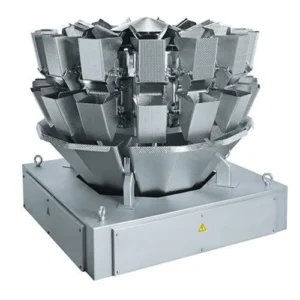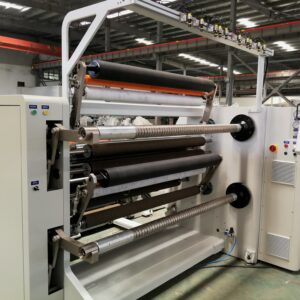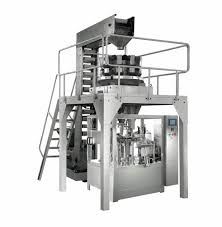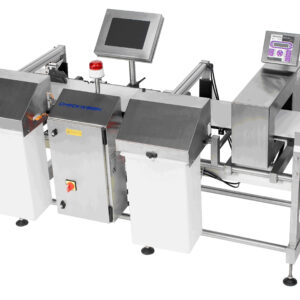Description
Checkweigher Introduction
In today’s dynamic manufacturing and packaging industries, accuracy and efficiency are vital. A check weigher is one of the most important components for ensuring quality and regulatory compliance of products coming out from the production line. It is a machine that checks the weight of packaged goods to ensure they meet predetermined standards. This important equipment is very useful in different sectors such as food and beverage, pharmaceuticals, cosmetics, and logistics among others. Check-weighers help prevent underweight or overweight items from reaching consumers, hence maintaining product integrity and regulatory compliance through accurate weighing as products move along conveyor belts or other transport mechanisms. Some of the features found in modern checkweighers due to technology development include high levels of accuracy, speed, the ability to be customized, and data management capabilities with user-friendly interfaces among others. As manufacturers seek increased efficiency and better quality control; it becomes more necessary to understand how to check weighers work within production systems.
Understanding Check Weighers
What does it mean to say that something is a check weigher?
A check weigher refers to an automated device used in verifying the weight of packed materials; thus ensuring that they are within pre-determined ranges of weights. Industries such as food processing companies, pharmaceutical firms, and cosmetic manufacturers among many others widely use them.
How do Check Weighers Work?
Check weigher’s work by weighing items while they pass along conveyor belts or any other form of transportation means where these kinds of systems exist. The process usually consists of three major phases: –
Weighing – Items are placed on the belt which carries them under a scale that measures their weight accurately.
Comparison – Weight measured vis-à-vis target pre-set values. If the mass falls within range then the product remains on the line moving forward with production whereas if the mass is above or below acceptable limits then action will be taken by the check weigher such as diverting it for manual inspection or adjustment as required;
Data Logging – a good number of check weighers have features for data logging to capture weight-related information that is important for quality control and compliance purposes.
Types of Check Weighers
1. In-Motion Check Weighers
In-motion check weighers are used when products are weighed while on the move. They are ideal for high-speed production lines requiring continuous weighing.
2. Static Check Weighers
Unlike in-motion check weights, static ones require items to come to a standstill before they can be weighed. It is not as fast as their counterparts but it is highly accurate for use in applications that require precision measurements.
3. Combination Check Weighers
Combination check weighers simultaneously handle numerous tasks including metal detection or x-ray examination while checking the weight at the same time. This ensures streamlined production processes and comprehensive quality control.
Checkweigher Characteristics
1. Precision Measurement
Check weighers exhibit high levels of accuracy frequently measuring weights down to fractions of grams thus ensuring adherence to set regulations and maintaining product quality.
2. Speedy Operation
Speed is essential where production volumes are high hence check weigher speed is very critical because any interruption causes loss of time which translates into money loss by the company.
3. Customizable Parameters
Different makes offer different parameters allowing manufacturers to suit specific applications such as adjustable weight ranges, conveyor belt widths, sorting mechanisms, etc.
4. Data Management
Advanced data management capabilities can be found in modern-day check weighing equipment enabling users to have up-to-date monitoring of their production KPIs or integration with other systems like ERP (Enterprise Resource Planning).
5. Hygienic Design:
In food processing industries or pharmaceuticals, cleaning is an important factor that must be considered; so some models of these do conform to industry standards regarding sanitation and cleanliness.
6. User-friendly Interface
Checkweighers have intuitive interfaces to make operation and configuration easier. This implies that the machine can be easily set up and adjusted by operators.
What Does a Checkweigher Do?
1. Weight Confirmation
The first purpose of check weights is to confirm if the weight of products corresponds with predetermined standards. By doing this, consumers are saved from underweight or overweight products.
2. Rejection Mechanism
To save time, check weighers have built-in reject mechanisms that automatically send out-of-specification products off the line so that only those within acceptable weight range proceed for packaging and distribution.
3. Data Capturing and Reporting
Each product’s weight is captured on check weighers for purposes of manufacturing records, trend identification as well as generating quality control reports.
4. Interfacing with Other Systems
Most check weigher systems are designed to fit in smoothly with other machines like filling machines, labeling systems, or packing machines along the production line. This ensures that there is consistency in quality control across all stages of production hence making it easier for manufacturers to handle large quantities of items at once.
5. Conformity to Regulations
Check weights are essential in enabling companies to meet product weight and label-related rules set by authorities regarding their goods. Non-compliance results in penalties and fines which can be avoided if specified weights are achieved for such products.
Frequently Asked Questions (FAQs)
1. How precise are check weights?
Some models can measure down to fractions of a gram; thus they are quite accurate.
2. Can check weighers accommodate various sizes and shapes?
A number of these devices come with adjustable features and hence can be used to weigh any item regardless of its size or shape provided it falls within its capacity thus saving you money since you will not need many machines depending on how big your company is.
3. How fast do checkweighers operate?
High speed is an attribute common among most modern-day dynamic checkers. This is based on the fact that they are used on a fast-moving production line. However, the speeds of these devices may vary depending on factors such as size, weight, and belt design.
4. Are check weighers hard to set up and operate?
Check weighers in use these days have been simplified in their design and operation to make it easy for anyone to understand how to work with them in addition to the training given by manufacturers on how best one can perform his operations during working.
5. Can check weighers be linked with other quality control systems?
This is why you will find that several high-end models can easily connect with metal detectors or X-ray machines among others. Some firms dealing with edible products make checkups for food contamination by detecting metals which might also be harmful when consumed together with their goods.
6. How do check weighers ensure product hygiene?
These devices must meet strict hygiene requirements as well as purposes designed for sectors handling food, drugs, and beverages or pharmaceutical industries. The materials used in fabricating these devices are long-lasting and also obtainable in various finishes so that cleaning them becomes easier.
7. Do check weighers need regular calibration?
Calibration should be done regularly especially when continuing accuracy and reliability are desired by all users of a weighing scale like a checker because it enables you to know more about its ability to register weight readings correctly within a specific period
8. Can check weighers detect foreign objects in products?
Some specialized ones equipped with metal detectors or x-ray scanners could help identify any form of foreign body found inside most items getting into those weighing scales even if they were mainly set to determine mass alone among all sampled commodities whereas some are only capable of determining weights.
9. Can check weighers be employed in hazardous environments?
It’s important to note however that we also have some that have been certified fit for hazardous environment operating conditions since they abide by related safety standards that regulate such settings in question.
10. What factors should I consider when selecting a check weigher?
The choice of an ideal checker will depend on several factors like the type of goods to weigh, daily production count, required accuracy level, and compatibility with other existing systems used in the premises. Therefore, you need to consult well before making your final decision so that you can receive advice from different people who are experienced regarding this issue.





